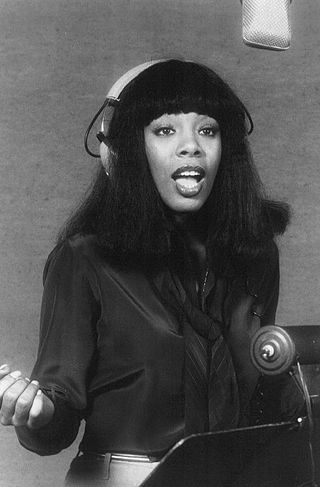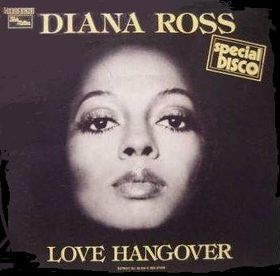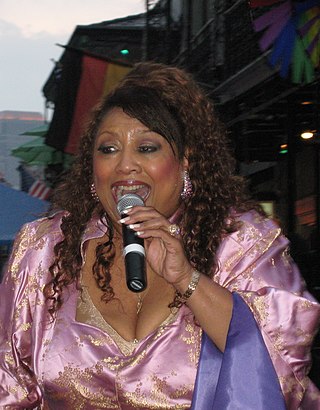Related Research Articles

Disco is a genre of dance music and a subculture that emerged in the 1970s from the United States' urban nightlife scene. Its sound is typified by four-on-the-floor beats, syncopated basslines, string sections, brass and horns, electric piano, synthesizers, and electric rhythm guitars.

Gloria Gaynor is an American singer, best known for the disco era hits "I Will Survive" (1978), "Let Me Know " (1979), "I Am What I Am" (1983), and her version of "Never Can Say Goodbye" (1974).

LaDonna Adrian Gaines, known professionally as Donna Summer, was an American singer and songwriter. She gained prominence during the disco era of the 1970s and became known as the "Queen of Disco", while her music gained a global following.
Tina Charles is an English singer who achieved success as a disco artist in the mid to late 1970s. Her most successful single was the UK no. 1 hit "I Love to Love " in 1976.
Frederick James Perren was an American songwriter, record producer, arranger, and orchestra conductor. He co-wrote and co-produced songs including "Boogie Fever" by the Sylvers, "I Will Survive" by Gloria Gaynor, and "Shake Your Groove Thing" by Peaches & Herb.

"Love Hangover" is a song by the Motown singer Diana Ross, recorded in 1975 and released as a single on March 16, 1976. It rose to number one on the Billboard Hot 100 and Hot-Selling Soul Singles. It also hit number one on the Record World disco charts.

Lime is a Canadian disco band from Montreal, Quebec. The group was originally composed of married couple Denis and Denyse LePage who had a 1981 number one US Dance hit with "Your Love". They continued to perform as recently as 2018, although others have also performed under the name of Lime.
Dance Club Songs is a chart published weekly by Billboard magazine in the United States. It is a national look over of club disc jockeys to determine the most popular songs being played in nightclubs across the country. It was launched as the Disco Action Top 30 chart on August 28, 1976, and became the first chart by Billboard to document the popularity of dance music. The first number-one song on the chart for the issue dated August 28, 1976, was "You Should Be Dancing" by the Bee Gees, spending five weeks atop the chart and the group's only number-one song on the chart.

Carol Douglas is an American singer whose hit "Doctor's Orders" (1974) was a pioneering track in the disco genre.
Debbie Jacobs is an American singer who had several disco hits.

Evelyn "Champagne" King is an American singer, songwriter, and record producer. She is best known for her hit disco single "Shame", which was released in 1977 during the height of disco's popularity. King had other hits from the early through the mid–1980s including; "I'm in Love" (1981), "Love Come Down" (1982) and "Your Personal Touch" (1985).

Martha Elaine Wash is an American singer-songwriter, actress, and producer. Known for her distinctive and powerful voice, Wash first achieved fame as half of the Two Tons O' Fun, who sang backing vocals for the disco singer Sylvester including on his signature hit "You Make Me Feel ". After gaining their own record deal, they released three consecutive commercially successful songs which all peaked at number two in the dance charts. The duo was renamed The Weather Girls in 1982 after they released the top-selling single "It's Raining Men", which brought them to mainstream pop attention. The Weather Girls released five albums and were heavily featured on Sylvester's albums.
D Train was an American duo that had hits on the Billboard magazine Dance and R&B charts during the first half of the 1980s. Three of their singles also reached the top 30 in the UK Singles Chart.

Jeanie Tracy is an American singer-songwriter, actress, and record producer. She rose to fame in the late 1970s as a background singer of Sylvester, an American disco singer. Her first album, Me and You (1982), featured post-disco hits "I'm Your Jeanie","Sing Your Own Song" and the overlooked 1983 smash R&B and Funk hit,"Can I Come Over And Play With You Tonight". From late 1984 to early 1985, she performed on television Show Star Search where she was the winner in the Female Vocalist category for six weeks. In 1995, Tracy released her second album It's My Time.

"Last Dance" is a song by American singer Donna Summer from the soundtrack album to the 1978 film Thank God It's Friday. It was written by Paul Jabara, co-produced by Summer's regular collaborator Giorgio Moroder and Bob Esty, and mixed by Grammy Award-winning producer Stephen Short, whose backing vocals are featured in the song.
"If I Can't Have You" is a disco song written by the Bee Gees in 1977. The song initially appeared on the Saturday Night Fever soundtrack in a version by Yvonne Elliman, released in November 1977. The Bee Gees' own version appeared a month later as the B-side of "Stayin' Alive".

The discography of American singer Diana Ross, the former lead singer of the Supremes, consists of 25 studio albums and 116 singles. Throughout her career, Ross has sold over 100 million records worldwide. Billboard ranked her as the 47th Greatest Artist of all time and the 11th Greatest Hot 100 Female Artist of all time. In 1993, Guinness World Records crowned Ross as the "most successful female artist in music history". Her 11th studio album "Diana" remains the best-selling album of her career, selling more than 10 million copies around the world.

Linda Clifford is an American R&B, disco and house music singer who scored hits from the 1970s to the 1980s, most notably "If My Friends Could See Me Now", "Bridge over Troubled Water", "Runaway Love" and "Red Light".

"LoveGame" is a song released by American singer Lady Gaga from her debut studio album, The Fame (2008). Produced by RedOne, the track was released as the album's third single in North America and Europe and the fourth single in Australia, New Zealand, and Sweden after "Eh, Eh ". "LoveGame" was also released as the fourth single in the United Kingdom, after "Paparazzi".

"Hi-Jack" is a 1974 r&b and funk disco based song written by Spanish musician Fernando Arbex and originally recorded by his group Barrabás for their album ¡Soltad a Barrabás!. While their version of the song was a huge success in their native Spain, going all the way to Number one over there, the song flopped in America, stalling at just number No. 104 on the Bubbling Under the Billboard Hot 100 Charts in July 1975. It was later a hit single for jazz flautist Herbie Mann.
References
- ↑ Whitburn <, Joel (2004). Hot Dance/Disco: 1974-2003. Record Research. p. 133.